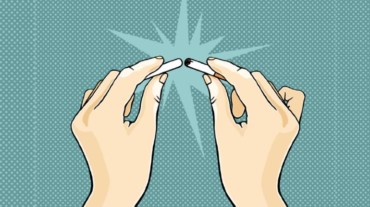
If you are planning to quit smoking or have recently quit, you have taken a huge first step towards your health recovery. While you may already be aware of the benefits of quitting smoking, You may also be thinking if your lungs can actually heal after you break up with the smoking habit.
The lungs begin to heal as soon as you quit smoking, which is why it is important that you quit sooner than later as it will lead you to improve your overall health. However, it will be a long commitment towards your lungs to help them heal themselves after you smoke your last cigarette.

National No Smoking Day, on March 9 2022, highlights the importance of raising awareness to quit smoking, nicotine addiction and improve your lung health.
For optimal brain function, good mood, and energy, oxygen is necessary. It can help you gain strength, improve your immune system, and reduce anxiety and stress. Your lungs are responsible for delivering oxygen to your entire body, which is essential for all your organs and cells. You will be at a higher risk of illness and diseases, including cancer, if you do not have access to clean and sufficient oxygen. Smoking destroys the tissues of your lungs, affects your respiratory system, and stops them from functioning properly.
A cigarette smoke consists of more than 7,000 harmful compounds. These substances have the potential to harm the lungs as it narrows your lung airways. Cigarette smoke has a variety of health impacts on the body and lungs, including the development of lung cancer. Lung cancer accounts for 6.9 percent of all new cancer cases and 9.3 percent of all cancer-related fatalities in both men and women in India. Smokers are twenty times more likely than non-smokers to develop lung cancer.
Also Read: Don’t fall for these 9 myths if you’re trying to quit smoking

Emphysema, a chronic obstructive lung disease, can be caused by smoking COPD (Chronic Obstructive Pulmonary Disease) causes shortness of breath and trouble breathing because it kills a section of the lungs known as the alveoli, which is where oxygen and carbon dioxide are exchanged.
The walls of the airways lose their form and elasticity once a person’s lungs are infected to the degree of emphysema, making it harder to push all of the air out of the lungs. These alterations to the lungs are permanent and irreversible. According to scientists, while emphysema symptoms appear a few years after a person begins smoking, but there are chances that symptoms may not appear for 20 to 30 years.
Although the human body is capable of healing some of the damage caused by smoking to lung cells and tissues, not all the harm is reversible. Damage to the lungs and a decline in lung function are proportional to the number of packs of cigarettes smoked per day and the number of years smoked, a metric known as “pack-years”. The lungs have protections in place to defend themselves from injury, but these defenses are weakened by long-term exposure to the hazardous compounds inhaled from cigarettes. Smoking causes lung tissues to become irritated and scarred, and the lungs lose flexibility and become unable to exchange oxygen.
Also Read: Put that cigarette down because it’s leading to early ageing
Select Topics of your interest and let us customize your feed.
PERSONALISE NOW
The bright side of quitting cigarette is your lungs will start self-cleaning, which means they will gradually heal and regenerate independently. You can reverse the years of damage caused due to smoking in the past.
According to FDA, carbon monoxide levels in your blood return to normal within 12 hours of your last cigarette, which increases oxygen-blood flow. Withing one year of quitting smoking, you are less likely to suffer a heart attack, and withing two to five years, you can reduce your risk of stroke to that of a non-smoker. Your circulation improves and your lung function increases.
It is never too late for quitting smoking and quitting at any age can help people breathe better and increase their life expectancy.